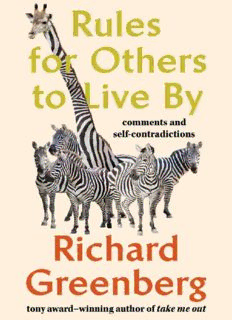
Rules for Others to Live By: Comments and Self-Contradictions PDF
Preview Rules for Others to Live By: Comments and Self-Contradictions
ALSO BY RICHARD GREENBERG Our Mother’s Brief Affair The Assembled Parties The House in Town The Violet Hour Take Me Out The Dazzle Everett Beekin Three Days of Rain Night and Her Stars Life Under Water The American Plan The Author’s Voice For Shirley Levine Greenberg, who admired writers Contents Also by Richard Greenberg Title Page Copyright Dedication Apology to Oprah Introduction MANIFESTO Wisdom CITY Selves Well, You’ve Just Been a Delight, or New York City in the Eighties Mediocrity: An Appreciation I Completely Agree, But: Two Nostalgias Local Character Weatherless Chelsea As I Was Saying to Kitty Genovese Here, Too, Is New York Here’s an Idea In the Moment My Racial Incident CITY FRIENDS Trapped My Friend, the Murderer Manqué Surprising Friend Socialism Worst-Case Scenarios Friendship Cute Idea STORYTELLING My First-World Problem and Go Fuck Yourself Origin Myth Genre/Role Rich People Selling Out Triumph A Plea for Universal Misunderstanding Presence Anecdote HEALTH, EDUCATION Goodness Doctors/Diagnosticians Sleep Oblivion Malpractice Age CITY FRIENDS, NEW AND UPDATED Deferred On Liking Racist Things OBLIGATORY My Best Recipe SEVERAL DEAD WOMEN OF WHOM I WAS FOND Maeve and Fredda In Order of Disappearance THINGS ARE LOOKING UP, MAYBE; AND BACK Opinions Nuptials Byrne the Witch: My Radical Youth On the Other Hand . . . A Paradox Explained Ignorance Meaning The Sump Trees Dinner Local Character, Part 2 Acknowledgments About the Author Apology to Oprah Everything in this book is true. Some names have been changed. A few names, though the real names, have been misspelled. Some of the events described, while they actually happened, did not actually happen in the rooms in which I’ve placed them. If you think a character is based on you, and you do not like that character, that character is not based on you. A few of the people I describe do not, in the strictest sense of the word, exist. One or two of the stories that feature people who do not exist may not have happened. The character called “I” is a total fabrication. This book is a work of fiction. Introduction The young woman—a girl, really: eighteen—was touching. She was writing plays and frustrated that they were invariably about herself. I failed her. My advice boiled down to “There, there.” She was young; later she would be old. Things would sort themselves out. On the ride home from her question, I gave myself a do-over. Make a helpful answer. In the mirage of a second draft I said this: “Acknowledge that you’re the center of the universe, then radiate.” She wanted a specific exercise; she wanted out! Go online, I told her, and bring up the front page of the New York Times from the day you were born. Read every article. In amazement. True, we no longer believe that A caused B then C happened, as playwrights who thought they were emulating Ibsen did. This should not be taken to mean that nothing causes anything. More that everything causes everything. We travel through clouds of influence. The New York Times will show you some of the influences into which you were born. Do they stun you? Does any of it seem familiar? The New York Times was already guessing what would be happening now; was it naive? Does anything explain that thing your dad is always saying? Does some fact interest you for reasons that apparently have nothing to do with you? Pursue it. In some distant manner, it’s connected to you. The best thinking says “the self” is a fiction (I have a piece about that), yet it’s a fiction that we all believe, our most intimate experience. Maybe it’s nothing more than our tendency to repeat. Maybe we repeat because when we do, we recognize the behavior and the familiarity is comforting. So that the self is just the consolation of our tendencies. This is too deep for me. The reason I never write personal essays is that I have no idea who “I” is. Setting out to write some, I had to locate my main tendencies and, for the sake of convenience, label them. I would say I am an Urban Recluse. The phrase is problematic, luckily. My brother, who trained as an economist, once accused me, as though I transgressed, of being the kind of human integer that screwed up his quantitative analyses (at last, a virtue!). Maybe so. My life goes heavy on the interiors; still, it’s crucial that their windows look out on the densest, most complex, most confounding system of social arrangements yet devised. It’s what I like to watch. Then I make up stories about it. My tendency. When I call myself an Urban Recluse, I know the phrase doesn’t constitute an identity, much less a self. It’s the angle from which I radiate, and that’s all I have to say about it.
Description: